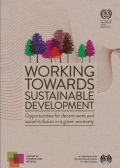As the global population heads toward 9 billion by 2050, decisions made today will lock countries into growth patterns that may or may not be sustainable in the future. Care must be taken to ensure that cities and roads, factories and farms are designed, managed, and regulated as efficiently as possible to wisely use natural resources while supporting the robust growth developing countries still need. Economic development during the next two decades cannot mirror the previous two: poverty reduction remains urgent but growth and equity can be pursued without relying on policies and practices that foul the air, water, and land.
The book includes case studies from Hannover (Germany), Auckland (New Zealand), Flanders (Belgium), Western Canada, City of Raleigh (United States), and Kyoto (Japan).
Bringing together 35 contributions from over 60 experts from research, the private sector, international organisations and local governments worldwide, ICLEI’s compendium bridges the gap between the global promotion of the concept and its actual realisation on the ground by illustrating the advantages of the Green Urban Economy approach with concrete and practical examples.
By embedding both economic and environmental concerns in policymaking, the compendium calls for smarter approaches and innovation in applying existing tools and new methods towards achieving sustainable urban development. Covering issues such as governance, economics, new business models, green jobs, technology, infrastructure, urban poverty, it is also an acknowledgement of and call for more locally responsive actions, new thinking and research.
The book includes case studies from Hannover (Germany), Auckland (New Zealand), Flanders (Belgium), Western Canada, City of Raleigh (United States), and Kyoto (Japan).
This volume examines the experiences of 21 developed and developing countries in adjusting their training provision to meet the new demands of a greener economy. Analysts started by identifying the drivers of transformation to a greener economy – changes in the physical environment itself and changes induced by government regulations, more efficient technologies and changes in consumer demand. Then they assessed the effect of these changes on employment, identifying areas of job growth and of job loss
Only then could researchers start to understand how skill requirements are changing and are expected to change in the future, and to examine how well national training systems are anticipating and responding to these new needs. Their analysis shows that skills development is critical to unlocking the employment potential of green growth, yet skills shortages are becoming an obstacle in realising this potential. The report recommends that countries devise strategies based on well-informed policy decisions, social dialogue, and coordination among ministries and between employers and training providers.
China’s economy continues to grow rapidly with corresponding increases in both energy consumption and environmental pollution. Renewable energy is a key part of China’s response to this challenge. Currently, the costs of measures to facilitate the large-scale deployment of renewable energy are primarily met through an electricity surcharge—effectively a tax on electricity consumption. However, concerns have been raised that continuing to rely on the surcharge alone places a disproportionate burden on electricity consumers. In response, the International Institute for Sustainable Development (IISD) and the China National Renewable Energy Centre (CNREC) identified the need for further debate on how best to fund renewable energy and reduce environmental pollution, leading to the establishment of a research project to examine the international experience of similar schemes and their relevance to China.
The publication includes case studies from Australia, Canada, Denmark, Germany, India, Japan, the United Kingdom, and the United States.

This joint study by the International Labour Organisation (ILO) and the United Nations Environment Programme (UNEP) highlights that the transformation to a greener economy could generate 15 to 60 million additional jobs globally over the next two decades and lift tens of millions of workers out of poverty. The report documents evidence that for countries at all levels of development the drive towards environmental sustainability and greener economies is gaining momentum. The study indicates that job growth has been particularly strong in the renewable energy sector, with a global increase of 21 per cent per annum. As a result, the sector now employs close to 5 million workers; more than double the number employed only a few years ago.
This summary was prepared by Eldis.
